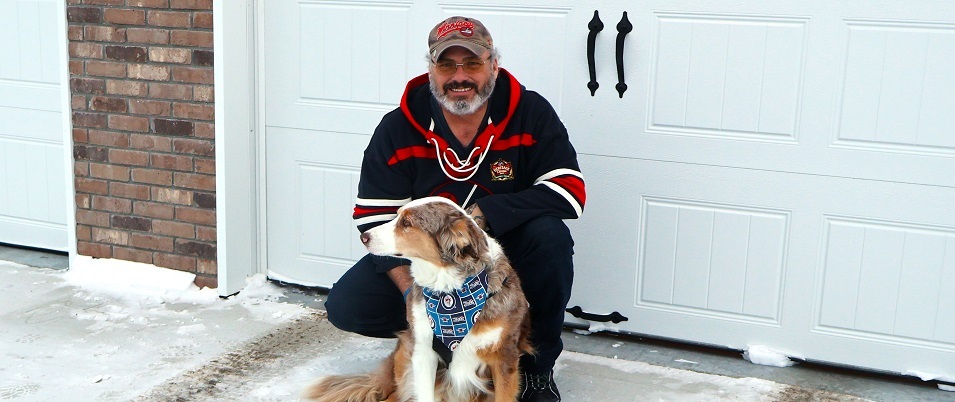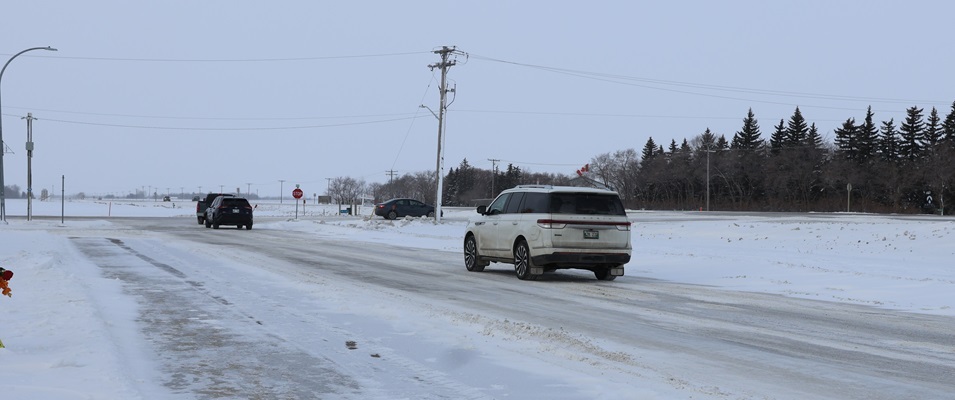
On January 17, Niverville’s town council voted in favour of accepting a new bylaw pertaining to service animals, laying out the policy under which they will be welcomed into public facilities.
According to the bylaw, a service animal is described as an animal that is trained to provide assistance to a person with a disability. The disability could be visible, such as a visual impairment, and could also be invisible, such as epilepsy.
Service dogs may also accompany a peace officer in the execution of their duties.
The goal of the bylaw is to remove barriers experienced by those with physical, mental, intellectual, or sensory disabilities which may hinder that person’s full and effective participation in society.
While pets are still restricted from entering local public facilities, the Town of Niverville recognizes that trained service animals are the exception to that rule since they provide important functions for the people who own them.
Service animals, most often dogs, can be trained to guide the visually-impaired and alert the hearing-impaired. They can assist those with limited mobility, protect a person during a seizure, or remind someone to take their medication.
According to federal law, certified service dogs are allowed wherever the handler goes with the exception of places where food is processed and produced. This includes taxis and public transport vehicles, stores, malls, theatres, and essentially any place that is open to the public.
Business owners and service providers cannot decline access to a service dog, but they can request proof, such as a letter from a medical professional, indicating that the dog is required by the handler.
Many service dogs are easily recognizable by their vest or band, which is issued by a certified service animal trainer once their training is complete.
In recent years, service animals have also become much more widely recognized for the significant role they can play in improving the quality of life for someone living with debilitating mental illnesses such as autism or PTSD.
But while terms such as support, therapy, or comfort animal are becoming more broadly used, under most legislation an animal won’t qualify for public access clearance unless it’s been professionally trained to perform a specific task that is directly related to the disability of its handler.
A Service Dog for Leia
Eleven-year-old Leia lives in St. Adolphe. She loves the same things most kids her age love: Lego, video games, crafts, and animals. Leia has been diagnosed on the autism spectrum.
According to her mom, Nadine Huberdeau, Leia’s anxiety and sensitivity to loud noises have made it difficult, but not impossible, for her to go into public spaces in the past.
During the pandemic, though, Leia’s challenges intensified, like they did for many kids who struggle with mental health concerns.
For over two years now, Leia hasn’t gone to school. As a matter of fact, she rarely leaves the house—and when she does, she’s unable to get past the end of the driveway.
When she tries, she has panic attacks that make her feel like she’s dying. Everyday noises, like the passing of a garbage truck, are enough to send her into a closet to hide.
What she wants more than anything is to be normal, like other kids.
“We’ve noticed that having an animal with her helps comfort her and gets her to push herself a little bit,” says Huberdeau. “And when we saw that happen, we thought, ‘Maybe a service dog would be the right way to go.”
According to Huberdeau, the cost to purchase a fully trained service dog, though, comes to around $40,000. It’s a cost that feels impossible, especially since Huberdeau quit work to be at home with Leia.
According to Leia’s mom, there are no available supports from Southern Health-Santé Sud or the government to provide service dogs to autistic children.
After months of conversations with service dog trainers, the next best option for the Huberdeaus felt somewhat more attainable, at $20,000. In this case, it means finding a trainable pup and hiring a professional to teach it to respond according to Leia’s needs.
“The service dog is not a cure,” Huberdeau clarifies. “It’s a tool.”
For Leia, it will be complemented by sessions with a therapist who makes house calls, an out-of-pocket cost also not covered by the healthcare system, according to Huberdeau.
Since that time, a young Golden Retriever pup had been selected based on its temperament, but it was discovered to have had unforeseen health issues. Unfortunately for the Huberdeaus, this means going back to square one and starting again.
“It will be slow,” Huberdeau says of her expectations for Leia’s progress. “Even if it’s just getting into town or getting to the mailbox at first.”
To help cover the costs of the service dog and its training, Huberdeau and friends are planning an online silent auction fundraiser which will run from February 28 to March 10. As well, a GoFundMe page has been set up in Leia’s honour (see details below).
A PTSD Sufferer and His Service Dog
Randy MacDonald lives in Niverville with his wife, kids, and his best pal Chance. Chance, an Australian Shepard, came into his life in 2018 and MacDonald describes that moment as completely life-altering.
Since the early 1990s, MacDonald has suffered with the symptoms of post-traumatic stress disorder (PTSD). Before meeting Chance, MacDonald says that he was virtually incapacitated by anxiety to the point where he, too, rarely left his home.
He relied heavily on alcohol in order to sleep and was known to his family and friends for his angry outbursts.
The first symptoms of PTSD began to show themselves after his Canadian military tour of duty in Croatia in 1993.
Fresh out of high school, MacDonald joined the military and trained as a combat fighter. Once deployed, he had the expertise to go into areas of conflict and take out the enemy, using whatever force was needed.
For seven months, MacDonald experienced the ravages of war in Croatia and the human toll exacted in that country’s war for independence from Serbia.
Despite his training, MacDonald and his company arrived in Croatia to discover that the war was governed by a United Nations rule which prevented the Canadian ground crew from taking aim at the enemy unless they, or the thing they were protecting, had been hit by enemy fire.
For MacDonald, this made him little more than a bystander, witnessing the carnage as innocent civilians were annihilated in front of his eyes. The Canadian team was rendered virtually powerless to protect them.
To make matters worse, he says, the enemy was very much aware of the restrictions imposed on the Canadian ground crew, and they took full advantage by shooting at military vehicles or blowing off explosives in close proximity, keeping MacDonald’s crew constantly vigilant.
Without an offensive option, MacDonald turned to humanitarian efforts within the local Croatian communities. He spent time in rebuilding efforts and making friends with the children. But all too often when his company returned to the community weeks later, it had been flattened by the enemy with people lying dead in the streets.
“[The military] doesn’t prepare you for the human aspects of going to war,” MacDonald says. “When I was younger, I was full of piss and vinegar. But when I got there, it was nothing like what I’d trained for… It’s like seeing a car wreck for the first time when you’re a young kid and no one telling you what’s happening. And you walk away and are left to [try making sense of it].”
MacDonald went on two more brief tours in the years that followed, including time spent clearing minefields. Eventually, as his PTSD symptoms worsened, he was moved to office and teaching jobs.
At the time, he says, the Canadian military offered no trauma resources for soldiers returning home from war.
“I used to go into a store and within 15 to 20 seconds I could tell you who looks sketchy, where the exits are, how big the aisles are, and, if anything happens, where I could go to hide,” he says. “I wouldn’t even go into a store if a guy had a backpack on because I didn’t know what was in their backpack.”
In 2001, MacDonald finally sought counselling on his own at the prompting of his wife, who worried for his well-being. The military finally retired him with a small pension a few years later.
Still, it took years for MacDonald to learn about the power of a support dog for those suffering with mental illness. It took him longer still to get over the stigma he felt was attached to people with mental illness and their service dogs.
Thanks to a friend, MacDonald discovered an organization in Ottawa that provides service dogs to military veterans and public service professionals who suffer with PTSD.
Funded through grants and fundraising initiatives, they are able to provide trained dogs, valued at $35,000, to qualifying recipients at no charge.
MacDonald applied and qualified. Chance, still a puppy in 2018, was professionally trained to respond to MacDonald’s specific PTSD symptoms and came to live with him and his family later that year.
Being a highly sensitive service dog, Chance can sense when MacDonald’s heartrate increases and leans deeply into his side to reassure him and distract him from the source of his anxiety.
Because he’s deeply sensitive, he also shrinks when MacDonald succumbs to an episode of anger, teaching MacDonald to catch himself in advance and control his temper for the sake of his canine pal.
One month after receiving Chance, MacDonald accompanied his wife on his first Christmas shopping excursion in 23 years.
Today, MacDonald has kicked his addictions to alcohol and cigarettes. He’s taken up golf, joined a bicycle club, and has successfully attended heavily populated events like Jets and Nighthawks games.
Still Some Work to Do
While most people are becoming acclimatized to service dogs in public places, MacDonald says there’s still some work to do to educate people on how to respond to a service dog.
First and foremost, people must understand that the dog, while in public with his handler, is on duty. In order to perform his job to the best of his ability, the service dog must stay highly focused and vigilant at all times.
Reaching out to pet a service dog, talking to it, or even making eye contact with it serves as a distraction. Service dog owners ask that people, to the best of their ability, ignore the service dog altogether.
As well, many dog owners don’t understand the importance of keeping their leashed or off-leash pets at a substantial distance from a service dog at all times.
Handlers are not trying to be unfriendly when they allow a wide berth when walking around someone’s pet. But any sniff or nose nuzzle is a distraction.
In MacDonald’s case, as the handler of a very sensitive dog, he adds that other dogs pose risk in terms of friendly or unfriendly nips with the teeth. Any trauma caused to Chance by another dog could result in all his training being lost and his effectiveness as a service dog destroyed.
Five years in, MacDonald says that he can’t imagine his life without Chance in it. He’s grateful for the opportunity that his service pal has given him to experience life again.
“I want to make my family proud that I can come through a major conflict, [rise above] all the demons I face, and find my way.”




















